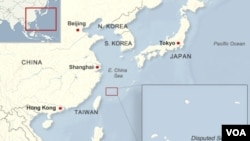A senior Chinese leader is calling for talks with Japan to resolve an increasingly bitter dispute over a group of islands in the East China Sea.
Jia Qinglin, who heads China's top political advisory body, made the comments during a meeting with former Japanese Prime Minister Yukio Hatoyama.
The state-run China Daily quoted Jia as saying Beijing places "great importance" on its ties with Japan, and that the dispute should be resolved in order to preserve regional stability.
His remarks are in contrast to Beijing's recent hard-line rhetoric on the long-running dispute, which has worsened significantly in the past few months, with both sides sending fighter jets to patrol the islands.
A China scholar at the University of Nottingham in Britain, Steve Tsang, tells VOA that Jia's comments are significant, even if they do not represent a fundamental change in Chinese policy.
"It is a very significant escalation and the risk of an unintended further escalation is very high. And therefore any move on the part of either government to try to back off from the escalation is a very positive thing," Tsang said.
For its part, Japan has rejected talks about the islands, saying there can be no discussions over territory it has long considered its own.
Hatoyama, the ex-prime minister who supports closer relations between the two Asian powers, told Jia during the Wednesday meeting that Tokyo should end its policy of not formally recognizing the dispute.
The Japanese government later criticized Hatoyama. Chief Cabinet Secretary Yoshihide Suga said it was "extremely regrettable" that a former prime minister would make such remarks, adding they were "clearly opposite" to Japan's position.
Hatoyama, who is making a private trip to China, pushed for closer relations with Japan's neighbors during his time as prime minister from September 2009 to June 2010.
China-Japan relations reached a low point last year after Japan nationalized some of the uninhabited islands, known as Senkaku in Japan and Diaoyu in China.
Since then, Beijing has sent regular patrol boats to "monitor" the Japanese-controlled islands, which are surrounded by rich fishing grounds and potential energy deposits.
Although there have been no clashes, both countries have sent fighter jets to the islands in recent weeks, raising fears of a conflict between Asia's two largest economies.
Japan annexed the islets in the late 19th century. China claimed sovereignty over the archipelago in 1971, saying ancient maps show it has been Chinese territory for centuries.
Jia Qinglin, who heads China's top political advisory body, made the comments during a meeting with former Japanese Prime Minister Yukio Hatoyama.
The state-run China Daily quoted Jia as saying Beijing places "great importance" on its ties with Japan, and that the dispute should be resolved in order to preserve regional stability.
His remarks are in contrast to Beijing's recent hard-line rhetoric on the long-running dispute, which has worsened significantly in the past few months, with both sides sending fighter jets to patrol the islands.
A China scholar at the University of Nottingham in Britain, Steve Tsang, tells VOA that Jia's comments are significant, even if they do not represent a fundamental change in Chinese policy.
"It is a very significant escalation and the risk of an unintended further escalation is very high. And therefore any move on the part of either government to try to back off from the escalation is a very positive thing," Tsang said.
For its part, Japan has rejected talks about the islands, saying there can be no discussions over territory it has long considered its own.
Hatoyama, the ex-prime minister who supports closer relations between the two Asian powers, told Jia during the Wednesday meeting that Tokyo should end its policy of not formally recognizing the dispute.
The Japanese government later criticized Hatoyama. Chief Cabinet Secretary Yoshihide Suga said it was "extremely regrettable" that a former prime minister would make such remarks, adding they were "clearly opposite" to Japan's position.
Hatoyama, who is making a private trip to China, pushed for closer relations with Japan's neighbors during his time as prime minister from September 2009 to June 2010.
China-Japan relations reached a low point last year after Japan nationalized some of the uninhabited islands, known as Senkaku in Japan and Diaoyu in China.
Since then, Beijing has sent regular patrol boats to "monitor" the Japanese-controlled islands, which are surrounded by rich fishing grounds and potential energy deposits.
Although there have been no clashes, both countries have sent fighter jets to the islands in recent weeks, raising fears of a conflict between Asia's two largest economies.
Japan annexed the islets in the late 19th century. China claimed sovereignty over the archipelago in 1971, saying ancient maps show it has been Chinese territory for centuries.





